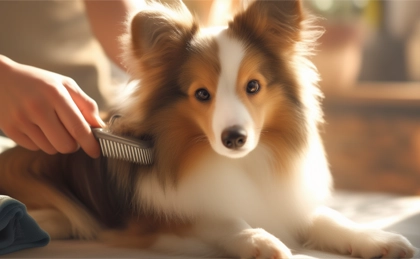Search our directory of Sheltie puppy breeders in Canada. Remember that dedicated breeders seek to produce champions, typically breeding only a couple of litters per year. Any puppies that don't meet the strict breed standard tend to be rehomed as pets. Never buy a puppy from a pet store, learn the warning signs of a puppy mill, and before you buy a Sheltie puppy, consider adopting a rescue Sheltie near you.
Search Sheltie Breeders: AB | BC | MB | NB | NL | NS | ON | QC | SK
Sheltie Breeders in Alberta
| Breeder |
Cathy & Cindy, Keystone Shelties |
| Location |
High River, Alberta |
| Contact |
keystoneshelties.com / shelties@keystoneshelties.com / 403-874-7417 |
| Breeder |
Yvonna Halkow, WillowGlyn Shelties |
| Location |
Gwynne, Alberta |
| Contact |
willowglyn.com / 780-361-2205 / willowglyn@gmail.com |
| Breeder |
Terese Karpluk, Terave Shetland Sheepdogs |
| Location |
Edmonton, Alberta |
| Contact |
teraveshetlandsheepdogs.com / 780-504-4833 / teresekarpluk@outlook.com |
| Breeder |
Laura Thompson, Zesta Shelties |
| Location |
Leduc, Alberta |
| Contact |
zestashelties.com / zesta@aol.com / 780-975-5179 |
| Breeder |
Margaret Zacher, Ladymagic Shelties |
| Location |
Edmonton, Alberta |
| Contact |
cdndogshow.com / marg.zacher@shaw.ca |
| Breeder |
Lorette Bain, LorWin Shelties |
| Location |
Grande Prairie, Alberta |
| Contact |
lorwinshelties.com / lorette@lorwinshelties.com / 780-933-5259 |
| Breeder |
Christina Hartley, Rolling Hills Shelties |
| Location |
Red Deer, Alberta |
| Contact |
rollinghills@xplornet.com |
| Breeder |
Tiffany & Lee Ramsden, Tremolo Shelties |
| Location |
Cayley, Alberta |
| Contact |
tremolo1@shaw.ca / 403-395-2106 |
| Breeder |
Donna-Rae Coatta, Mecca Shelties |
| Location |
Ardrossan, Alberta |
| Contact |
pcoatta@xplornet.com / 780-922-5207 |
| Breeder |
Clare Belanger, Avonlea Shelties |
| Location |
Leduc, Alberta |
| Contact |
avonleashelties@hotmail.com |
| Breeder |
Ann McMillan, Gratia Shelties |
| Location |
Calgary, Alberta |
| Contact |
gratiashelties@telus.net / 403-279-5994 |
| Breeder |
Helen Turchen, Nifty Shelties |
| Location |
Calgary, Alberta |
| Contact |
niftycan@netscape.net |
| Breeder |
Leona Stringer, Heartstrings |
| Location |
Calgary, Alberta |
| Contact |
lstring@telusplanet.net |
| Breeder |
Tracy Brown, Simitar |
| Location |
Calgary, Alberta |
| Contact |
tracy.brown@shaw.ca |
| Breeder |
Charlotte Edmunds, Strattonhill |
| Location |
Calgary, Alberta |
| Contact |
cedmunds@shaw.ca / 403-240-3715 |
| Breeder |
Verona Paterson Shelties |
| Location |
Calgary, Alberta |
| Contact |
veronap@telus.net / 403-669-8941 |
Sheltie Breeders in British Columbia
| Breeder |
Brenda Newlove, CanyonView Shelties |
| Location |
Kelowna, British Columbia |
| Contact |
canyonview.ca / shelties@canyonview.ca / 778-480-0059 |
| Breeder |
Denise & Doug Porter, Galenabay Shelties |
| Location |
Kaslo, British Columbia |
| Contact |
galenabayshelties.ca / galenabay.shelties@telus.net / 250-353-2436 |
| Breeder |
Kelly Morris, Sirona Shelties |
| Location |
Kelowna, British Columbia |
| Contact |
sironashelties.com / 250-868-6603 |
| Breeder |
Judy Tulloch, Coastalview Shetland Sheepdogs |
| Location |
Brentwood Bay, British Columbia |
| Contact |
coastalviewshelties.com / mzjuty@shaw.ca / 250-652-5317 |
| Breeder |
Petra, Tresta Shetland Sheepdogs |
| Location |
Victoria, British Columbia |
| Contact |
trestashelties.com / info@trestashelties.com |
| Breeder |
Joanne Howe, Conspirito Shelties |
| Location |
Crofton, British Columbia |
| Contact |
conspiritoshelties.com / conspirito20@gmail.com / 250-415-1357 |
| Breeder |
Tammy Kitami, Northview Kennels |
| Location |
Langley, British Columbia |
| Contact |
northviewknl.com / northviewknl@shaw.ca / 604-856-6603 |
| Breeder |
Susan Carbert, Madselin Shelties |
| Location |
Falkland, British Columbia |
| Contact |
madselin.com / madselin@telus.net |
| Breeder |
Rick & Robie Hambly, Ramora Shelties |
| Location |
Chilliwack, British Columbia |
| Contact |
ramorashelties.com / randrhambly@gmail.com |
| Breeder |
Liana Maloney, Cincerlee Shelties |
| Location |
Sooke, British Columbia |
| Contact |
cincerleeshelties.com / cincerleeshelties@gmail.com / 306-920-0400 |
| Breeder |
Avoca Shelties |
| Location |
Fraser Valley, British Columbia |
| Contact |
avocasheltie.ca / dinnes@shaw.ca |
| Breeder |
Joseph C Brant, Satelier Shetland Sheepdogs |
| Location |
Hedley, British Columbia |
| Contact |
250-292-8356 |
| Breeder |
Marjorie Stenson, Condura |
| Location |
Keremeos, British Columbia |
| Contact |
condura@telus.net / 250-499-0201 |
| Breeder |
Natalie Thomas, Mosaic Shelties |
| Location |
Parksville, British Columbia |
| Contact |
natalie_505@hotmail.com / 250-738-0414 |
| Breeder |
Barb McKee, Behaven |
| Location |
Qualicum Beach, British Columbia |
| Contact |
behaven1@telus.net / 250-752-2350 |
| Breeder |
Cherry Condrey, Pacificisle Shelties |
| Location |
Sidney, British Columbia |
| Contact |
c.condrey@shaw.ca |
| Breeder |
Beverley Guthrie, Sunnygate Shelties |
| Location |
Sardis, British Columbia |
| Contact |
sunnygateshelties@shaw.ca |
| Breeder |
Marilyn Bernard, Marpointe Shelties |
| Location |
Port Alberni, British Columbia |
| Contact |
marilynbernard54@gmail.com |
| Breeder |
Adriana Amelio, Lyrical Shelties |
| Location |
Victoria, British Columbia |
| Contact |
kcsisco@shaw.ca / 252-727-3431 |
Sheltie Breeders in Manitoba
| Breeder |
Sherrie Sparling, Skyehaven Shetland Sheepdogs |
| Location |
Ile-des-Chenes, Manitoba |
| Contact |
skyehaven.ca / shelties@mts.net |
| Breeder |
Betty & Kim Sawatzky, Amberlyn Shelties |
| Location |
Springstein, Manitoba |
| Contact |
amberlynshelties.org / sawatzkykimberley@gmail.com / 204-422-9115 |
| Breeder |
Michelle & Dale Rogowski, Cassbar Shelties |
| Location |
Headingley, Manitoba |
| Contact |
cassbarshelties.com / cassbarshelties@gmail.com |
| Breeder |
Marilyn O'Donnell, Dyniques Shelties |
| Location |
St. Anne, Manitoba |
| Contact |
dyniquesshelties.com / 204-355-4589 / modonnell@rainyday.ca |
| Breeder |
Claudia Proctor, Amaley Shelties |
| Location |
Winnipeg, Manitoba |
| Contact |
amaleyshelties.com / amaleyshelties@gmail.com / 431-588-6629 |
| Breeder |
Beldawn Shetland Sheepdogs |
| Location |
Winnipeg, Manitoba |
| Contact |
beldawn.ca / beldawnshelties@hotmail.com |
| Breeder |
Paula Reid, Padona Shelties |
| Location |
Ritchot, Manitoba |
| Contact |
padonashelties@hotmail.com |
| Breeder |
Kerry Nemet, Spruce Hollow Shelties |
| Location |
Winnipeg, Manitoba |
| Contact |
sprucehollow.kerry@gmail.com |
Sheltie Breeders in New Brunswick
| Breeder |
Cindy Picard, Fundy Coast Shelties |
| Location |
New Horton, New Brunswick |
| Contact |
lakeviewgoldenshelties.com / fundycoastshelties@gmail.com / 506-381-0339 |
| Breeder |
Judi & Bill Byrne, Lyricisle Shetland Sheepdogs |
| Location |
Saint John, New Brunswick |
| Contact |
lyricisle.com / bjbyrne@nb.sympatico.ca / 506-847-8715 |
| Breeder |
Jean & Len Cormier, Nikkilen Shelties |
| Location |
Moncton, New Brunswick |
| Contact |
nikkilenshelties.com / len.jean@bellaliant.net / 506-382-3721 |
| Breeder |
Brian & Linda Reid, TrueSpirit Shelties |
| Location |
Hampton, New Brunswick |
| Contact |
truespirit.ca / 506-832-0521 |
| Breeder |
Roxanne & Bonnie, Genson Kennels |
| Location |
Quispamsis, New Brunswick |
| Contact |
gensonpets.wordpress.com / gensonkennels@gmail.com / 506-849-7095 |
Sheltie Breeders in Newfoundland
| Breeder |
Len & Carolyn Dooling, Silverthaw Shetland Sheepdogs |
| Location |
St. John's, Newfoundland |
| Contact |
silverthaw@gmail.com / 709-368-9406 |
Sheltie Breeders in Nova Scotia
| Breeder |
Candede Kennels |
| Location |
Point Edward, Nova Scotia |
| Contact |
candede.00home.com / candede@syd.eastlink.ca |
| Breeder |
Karen & Rob Henley, Shelhaven Shelties |
| Location |
Rawdon, Nova Scotia |
| Contact |
shelhaven.ca / shelhaven@bellaliant.net / 902-632-2182 |
| Breeder |
Sharon Ayers, Talisker Shetland Sheepdogs |
| Location |
Halifax, Nova Scotia |
| Contact |
taliskershelties.wordpress.com / p4applause@gmail.com / 902-865-4868 |
| Breeder |
Norine Hynick, Nandita Shelties |
| Location |
Bridgewater, Nova Scotia |
| Contact |
p.n.p.hynick@ns.sympatico.ca |
| Breeder |
Dave & Phyllis Panting, Mcfey Shelties |
| Location |
Stewiacke, Nova Scotia |
| Contact |
902-639-2039 |
Sheltie Breeders in Ontario
| Breeder |
Heather Walton, Aberdale |
| Location |
Port Rowan, Ontario |
| Contact |
aberdale.com / aberdale@execulink.com / 519-550-6225 |
| Breeder |
Kim Aston & Pete Culumovic, Laureate Shelties |
| Location |
Ottawa, Ontario |
| Contact |
laureate.ca / laureate@storm.ca / 613 256-2003 |
| Breeder |
Darlene Allison, Ennismoor Collies & Shelties |
| Location |
Uxbridge, Ontario |
| Contact |
ennismoorcolliesandshelties.com / ennismoorcollies@yahoo.ca / 905-852-6631 |
| Breeder |
Diane, Alfenloch Collies & Shelties |
| Location |
Sarnia, Ontario |
| Contact |
alfenlochcollies.com / diane@alfenlochcollies.com / 519-614-2133 |
| Breeder |
Ken & Kathleen Yarrow, Bellwood Shelties |
| Location |
Peterborough, Ontario |
| Contact |
ameliasburg.tripod.com / kyarrow1@hotmail.com / 705-742-6994 |
| Breeder |
Brantstar Shelties |
| Location |
Port Dover, Ontario |
| Contact |
brantstarshelties.com / brantstar.shelties@gmail.com |
| Breeder |
Bonnie & Ted Taylor, Bonnyville Shelties |
| Location |
Dorchester, Ontario |
| Contact |
bonnyvilleshelties.com / bonnyville1@sympatico.ca / 519-268-8797 |
| Breeder |
Cline Ridge Shelties |
| Location |
Bradford, Ontario |
| Contact |
onecollieonesheltie.com / clineridgesheltie@gmail.com |
| Breeder |
Stonehaven Shelties |
| Location |
Hamilton, Ontario |
| Contact |
stonehavenshelties.com / stonehavenshelties@outlook.com |
| Breeder |
Lucy Douglas, Ciara Shelties |
| Location |
Waterford, Ontario |
| Contact |
ciarashelties.tripod.com / ciara_shelties@yahoo.ca / 519-443-6629 |
| Breeder |
Cyndy Ermel, Cermel Shelties |
| Location |
Waterloo, Ontario |
| Contact |
cermelshelties.com / cermel@rogers.com / 519-885-7008 |
| Breeder |
Evelyn Susin, Crinan Shelties |
| Location |
Ontario |
| Contact |
crinanshelties.com / info@crinanshelties.com |
| Breeder |
Tina King, TLC Kennels |
| Location |
Mallorytown, Ontario |
| Contact |
tlckennels.ca / tlccanines@xplornet.com |
| Breeder |
Bettijane Flanagan, Dalgarnoch Shelties |
| Location |
Thunder Bay, Ontario |
| Contact |
my.tbaytel.net/dalgar / dalgar@tbaytel.net / 807-633-1224 TEXT ONLY |
| Breeder |
Gary & Sue Pike, Granite Shelties |
| Location |
Ennismore, Ontario |
| Contact |
graniteshelties.ca / graniteshelties@gmail.com |
| Breeder |
Debbie & Ken Vandyk, Fairfax Shelties |
| Location |
Uxbridge, Ontario |
| Contact |
fairfaxshelties.com / debbie@fairfaxshelties.com / 905-649-2910 |
| Breeder |
Nancy Tibben, Golden Hylite Shelties |
| Location |
East Garafraxa, Onatario |
| Contact |
goldenhylite.com / goldenhylite@gmail.com |
| Breeder |
Bonnie & Jim Rector, Highledge Shelties |
| Location |
Hamilton, Ontario |
| Contact |
highledgeshelties.com / highledgeshelties@gmail.com |
| Breeder |
Jeff & Kellie Whiteside, Heardabout Shelties |
| Location |
Barrie, Ontario |
| Contact |
herdaboutshelties.com / sheltieland@rogers.com / 705-429-0833 |
| Breeder |
Susan Des Cotes, Surona Shelties |
| Location |
Toronto, Ontario |
| Contact |
suronablog.wordpress.com / surona@sympatico.ca / 519-938-8280 |
| Breeder |
Eleanor Leasa, Canrosea Shetland Sheepdogs |
| Location |
St. Marys, Ontario |
| Contact |
canroseashelties.ca / mleasa@quadro.net |
| Breeder |
Cathy Graham, Onawhim Shelties |
| Location |
Madoc, Ontario |
| Contact |
onawhimshelties.com / onawhimshelties@gmail.com |
| Breeder |
Susan Smethurst, Palisades Kennels |
| Location |
Hamilton, Ontario |
| Contact |
palisade.idirect.com / pallisades@bigwave.ca / 905-659-1690 |
| Breeder |
Linda, Ravenscourt Shelties |
| Location |
Port Dover, Ontario |
| Contact |
my.kwic.com/~james / james@kwic.com |
| Breeder |
Lynn & Rick Doel, Regaloake Shelties |
| Location |
Brampton, Ontario |
| Contact |
regaloakeshelties.com / dogsdogs@rogers.com / 905-459-1138 |
| Breeder |
Lee-Ann Hochins, Athill |
| Location |
Thunder Bay, Ontario |
| Contact |
athillshelties.com / leeannkz@hotmail.com / 807-933-0673 |
| Breeder |
Leslie & Charlotte Linton, Westdel Shelties |
| Location |
London, Ontario |
| Contact |
westdelshelties.com / 519-474-6358 |
| Breeder |
Catherin (Glover) Latreille, Winaway Shelties |
| Location |
Georgian Triangle, Ontario |
| Contact |
winaways.tripod.com / winawayshelties52@sympatico.ca |
| Breeder |
Brenda L Campbell, Amanchara Shelties |
| Location |
London, Ontario |
| Contact |
519-657-3516 |
| Breeder |
Cathy & Frank Pickard, Kincardine Shetland Sheepdogs |
| Location |
Orillia, Ontario |
| Contact |
kincardineshelties.com / kkincard@aol.com / 705-329-3332 |
| Breeder |
Irene Latchford, Nitelatches Shelties |
| Location |
Stoney Creek, Ontario |
| Contact |
nitelatchesshelties.com / latch4d@sympatico.ca / 905-643-6890 |
| Breeder |
Donna McCulloch, Rikadon Shelties |
| Location |
Chesley, Ontario |
| Contact |
rikadon@log.on.ca |
| Breeder |
Colleen Bennett, Pen Pals Shelties |
| Location |
Caledon, Ontario |
| Contact |
penpals@primus.ca |
| Breeder |
Cindy & Lisa Bays, Playland Shelties |
| Location |
Buckhorn, Ontario |
| Contact |
playland@nexicom.net |
| Breeder |
Maureen Merlo, Realities Shelties |
| Location |
Springfield, Ontario |
| Contact |
realities@go.cc |
| Breeder |
Susan Smethurst, Palisades Shelties |
| Location |
Ontario |
| Contact |
palisade@idirect.com |
| Breeder |
Sue McCleverty, Kneehi Shelties |
| Location |
Sunbury, Ontario |
| Contact |
kneehi@xplornet.ca / 613-353-7062 |
| Breeder |
Sharon Maclean, Sharl's Shelties |
| Location |
Oshawa, Ontario |
| Contact |
sharlsshelties@bell.net / 905-728-1352 |
| Breeder |
Sue & Jim Thomson, Refte Shelties |
| Location |
Kingston, Ontario |
| Contact |
jsthomsn@kingston.net |
| Breeder |
Genny Mount, Rezigrene Shelties |
| Location |
London, Ontario |
| Contact |
gennymount@sprint.ca |
| Breeder |
Gail Giles, Rhythm Shelties |
| Location |
Belleville, Ontario |
| Contact |
rythm.giles@sympatico.ca |
| Breeder |
Connie Haugh, Prettyview Shelties |
| Location |
Harriston, Ontario |
| Contact |
prettyview@wightman.ca |
| Breeder |
Sandra Millar, Papastour Shelties |
| Location |
Toronto, Ontario |
| Contact |
smillar@yorku.ca |
| Breeder |
Monique Boucher, Tervfect Shelties |
| Location |
Renfrew, Ontario |
| Contact |
613-602-1833 / tervfect@yahoo.ca |
| Breeder |
Robin Clemas, Hoodwink Perm Reg’d |
| Location |
Cargill, Ontario |
| Contact |
hoodwinkshelties@gmail.com |
| Breeder |
Dorothy Greenaway, Greendor Shelties |
| Location |
Goderich, Ontario |
| Contact |
greendor@cabletv.on.ca / 519-524-6811 |
| Breeder |
Laurie Bogaert, Bradshaw Shelties |
| Location |
Sombra, Ontario |
| Contact |
dlskbogaert@gmail.com / 519-892-3339 |
| Breeder |
Janet Julian, Cambria Shelties |
| Location |
Stratford, Ontario |
| Contact |
janetjulian@gmail.com / 416-779-3666 / No Website |
Sheltie Breeders in Quebec
| Breeder |
Rachelle Rodriguez, Cory Shelties |
| Location |
Quebec |
| Contact |
corysheltie.com / 418-833-5070 |
| Breeder |
Dany Therrien, Mélodaly |
| Location |
St Leonard d'Aston, Quebec |
| Contact |
melodaly.com / info@melodaly.com / 819 399-2817 |
| Breeder |
Danielle Hould, Mont Carmel |
| Location |
Notre-Dame-Du-Mont-Carmel, Quebec |
| Contact |
elevagemontcarmel.com danielle.hould@sympatico.ca / 819 537-1502 |
| Breeder |
Inga Paquin, Premina Shelties |
| Location |
Mirabel, Quebec |
| Contact |
premina.ca / sheltie@premina.ca / 450-258-3740 |
| Breeder |
Shalligy Shelties |
| Location |
Lanaudiere, Quebec |
| Contact |
shalligy-shelties.com / info@shalligy-shelties.com |
| Breeder |
Helen Latulippe & Daniel Demers, Nuhope Shelties |
| Location |
Val des Monts, Quebec |
| Contact |
nuhopeshelties@sympatico.ca |
| Breeder |
Monia Lasante, Selection Shelties |
| Location |
Haute-Mauricie, Quebec |
| Contact |
monia.lasante@gmail.com |
Sheltie Breeders in Saskatchewan
| Breeder |
Ann Elliott, Glenmorris Kennels |
| Location |
Carlyle, Saskatchewan |
| Contact |
glenmorris.ca / info@glenmorris.ca / 306-453-2858 |
| Breeder |
Gwen E. Krienke, Ksara Shelties |
| Location |
Vanscoy, Saskatchewan |
| Contact |
ksarashelties.com / ksarashelties@gmail.com / 306-260-2646 |
| Breeder |
Barbara Loitz, Ksenia Shelties |
| Location |
Elrose, Saskatchewan |
| Contact |
kseniashelties.ca / loitzle@sasktel.net / 306-378-7922 |
| Breeder |
Barb & Ray Selby, Prairiemist Shelties |
| Location |
Regina, Saskatchewan |
| Contact |
sheltiesofprairiemist.com / rselby925@gmail.com / 306-519-1416 |
| Breeder |
Karin Stever, Summerlove Shelties |
| Location |
Saskatoon, Saskatchewan |
| Contact |
kstever@shaw.ca |
| Breeder |
Wayne & Donna Lewis, Donayne Shetland Sheepdogs |
| Location |
Copper, Saskatchewan |
| Contact |
donayne@accesscomm.ca / 306-781-0171 |









